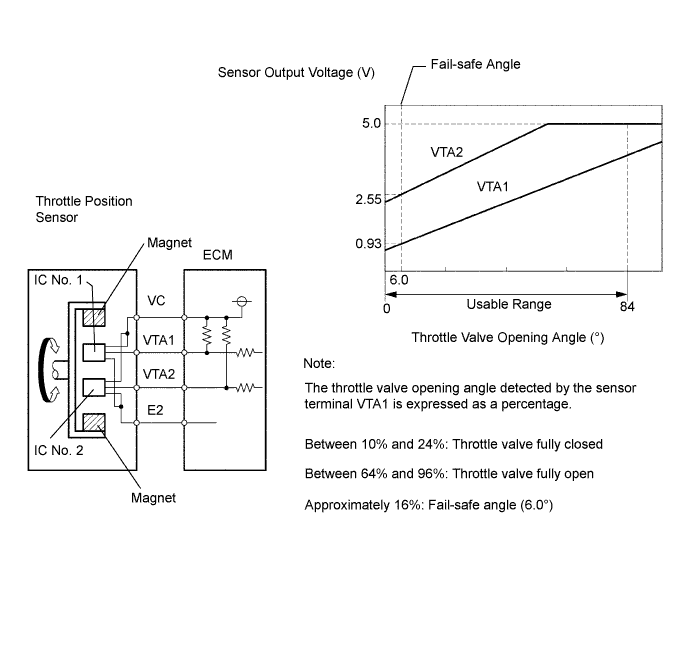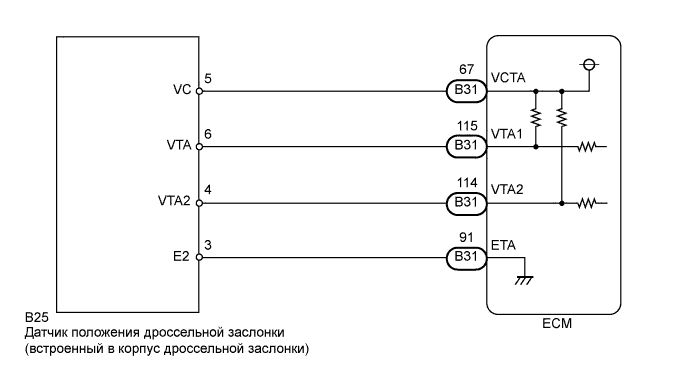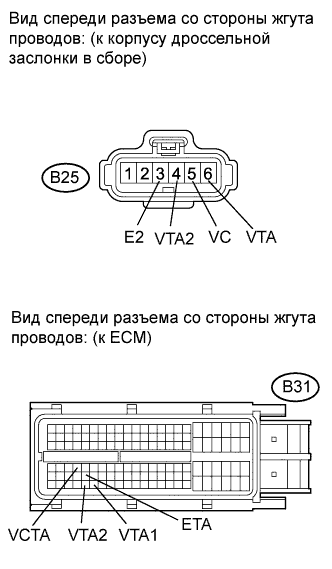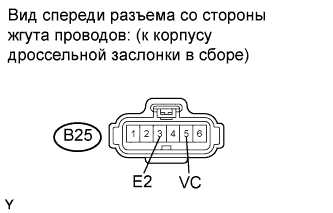READ VALUE USING INTELLIGENT TESTER (THROTTLE POSITION NO. 1 AND THROTTLE POSITION NO. 2)
CHECK HARNESS AND CONNECTOR (THROTTLE POSITION SENSOR - ECM)
REPLACE THROTTLE BODY ASSEMBLY
CHECK WHETHER DTC OUTPUT RECURS (THROTTLE POSITION SENSOR DTCS)
DTC P0120 Throttle / Pedal Position Sensor / Switch "A" Circuit Malfunction |
DTC P0122 Throttle / Pedal Position Sensor / Switch "A" Circuit Low Input |
DTC P0123 Throttle / Pedal Position Sensor / Switch "A" Circuit High Input |
DTC P0220 Throttle / Pedal Position Sensor / Switch "B" Circuit |
DTC P0222 Throttle / Pedal Position Sensor / Switch "B" Circuit Low Input |
DTC P0223 Throttle / Pedal Position Sensor / Switch "B" Circuit High Input |
DTC P2135 Throttle / Pedal Position Sensor / Switch "A" / "B" Voltage Correlation |
- УКАЗАНИЕ:
- These DTCs relate to the throttle position sensor.
DESCRIPTION
The throttle position sensor is mounted on the throttle body assembly, and detects the opening angle of the throttle valve. This sensor is a non-contact type. It uses Hall-effect elements in order to yield accurate signals even in extreme driving conditions such as at high speeds and very low speeds.The throttle position sensor has two sensor circuits which each transmits a signal, VTA1 and VTA2. VTA1 is used to detect the throttle valve angle and VTA2 is used to detect malfunctions in VTA1. The sensor signal voltages vary between 0 V and 5 V in proportion to the throttle valve opening angle, and are transmitted to the VTA terminals of the ECM.
As the valve closes, the sensor output voltage decreases and as the valve opens, the sensor output voltage increases. The ECM calculates the throttle valve opening angle according to these signals and controls the throttle actuator in response to driver inputs. These signals are also used in calculations such as air fuel ratio correction, power increase correction and fuel-cut control.

| DTC No. | DTC Detection Condition | Trouble Area |
| P0120 | Output voltage of VTA1 quickly fluctuates beyond lower and upper malfunction thresholds for 2 seconds when accelerator pedal is depressed (1-trip detection logic) |
|
| P0122 | Output voltage of VTA1 0.2 V or less for 2 seconds when accelerator pedal is depressed (1-trip detection logic) |
|
| P0123 | Output voltage of VTA1 4.535 V or more for 2 seconds when accelerator pedal is depressed (1-trip detection logic) |
|
| P0220 | Output voltage of VTA2 quickly fluctuates beyond lower and upper malfunction thresholds for 2 seconds when accelerator pedal is depressed (1-trip detection logic) |
|
| P0222 | Output voltage of VTA2 1.75 V or less for 2 seconds when accelerator pedal is depressed (1-trip detection logic) |
|
| P0223 | Output voltage of VTA2 is 4.8 V or more, and VTA1 is between 0.2 V and 2.02 V, for 2 seconds when accelerator pedal is depressed (1-trip detection logic) |
|
| P2135 | Either condition (a) or (b) is met (1-trip detection logic): (a) Difference between output voltages of VTA1 and VTA2 is 0.02 V or less for 0.5 seconds or more (b) Output voltage of VTA1 is 0.2 V or less, and VTA2 is 1.75 V or less, for 0.4 seconds or more |
|
- УКАЗАНИЕ:
- When any of these DTCs are set, check the throttle valve opening angle by selecting the following menu items on the intelligent tester: Powertrain / Engine and ECT / Data List / Throttle Position No. 1 and Throttle Position No. 2.
- Throttle Position No. 1 denotes the VTA1 signal, and Throttle Position No. 2 denotes the VTA2 signal.
- Reference (Normal Condition):
Tester Display Accelerator Pedal Fully Released Accelerator Pedal Fully Depressed Throttle Position No. 1 0.5 to 1.1 V 3.3 to 4.9 V Throttle Position No. 2 2.1 to 3.1 V 4.6 to 5.0 V
FAIL-SAFE
When any of these DTCs, as well as other DTCs relating to electronic throttle control system malfunctions, are set, the ECM enters fail-safe mode. During fail-safe mode, the ECM cuts the current to the throttle actuator off, and the throttle valve is returned to a 6° throttle angle by the return spring. The ECM then adjusts the engine output by controlling the fuel injection (intermittent fuel-cut) and ignition timing, in accordance with the accelerator pedal opening angle, to allow the vehicle to continue at a minimal speed. If the accelerator pedal is depressed gently, the vehicle can be driven slowly. Fail-safe mode continues until a pass condition is detected, and the ignition switch is then turned off.WIRING DIAGRAM

INSPECTION PROCEDURE
- УКАЗАНИЕ:
- Read freeze frame data using the intelligent tester. The ECM records vehicle and driving condition information as freeze frame data the moment a DTC is stored. When troubleshooting, freeze frame data can help determine if the vehicle was moving or stationary, if the engine was warmed up or not, if the air fuel ratio was lean or rich, and other data from the time the malfunction occurred.
| 1.READ VALUE USING INTELLIGENT TESTER (THROTTLE POSITION NO. 1 AND THROTTLE POSITION NO. 2) |
Connect the intelligent tester to the DLC3.
Turn the ignition switch on (IG) and turn the tester on.
Select the following menu items: Powertrain / Engine and ECT / Data List / Throttle Position.
Read the values displayed on the tester.
- Result:
Throttle Position (VTA1)
When Accelerator Pedal ReleasedThrottle Position No. 2 (VTA2)
When Accelerator Pedal ReleasedThrottle Position (VTA1)
When Accelerator Pedal DepressedThrottle Position No. 2 (VTA2)
When Accelerator Pedal DepressedTrouble Area Proceed to 0 V to 0.2 V 0 V to 0.2 V 0 V to 0.2 V 0 V to 0.2 V VC circuit open A 4.5 V to 5.0 V 4.5 V to 5.0 V 4.5 V to 5.0 V 4.5 V to 5.0 V E2 circuit open 0 V to 0.2 V,
or 4.5 V to 5.0 V2.4 V to 3.4 V
(Fail-safe)0 V to 0.2 V,
or 4.5 V to 5.0 V2.4 V to 3.4 V
(Fail-safe)VTA1 circuit open or ground short 0.7 V to 1.3 V
(Fail-safe)0 V to 0.2 V,
or 4.5 V to 5.0 V0.7 V to 1.3 V
(Fail-safe)0 V to 0.2 V,
or 4.5 V to 5.0 VVTA2 circuit open or ground short 0.5 V to 1.1 V 2.1 V to 3.1 V 3.3 V to 4.9 V
(Not fail-safe)4.6 V to 5.0 V
(Not fail-safe)Throttle position sensor circuit normal B
- УКАЗАНИЕ:
- Throttle position denotes Throttle Position No. 1, and throttle position No. 2 denotes Throttle Position No. 2.
|
| ||||
| A | |
| 2.CHECK HARNESS AND CONNECTOR (THROTTLE POSITION SENSOR - ECM) |
Disconnect the throttle body connector.
 |
Disconnect the ECM connector.
Measure the resistance according to the value(s) in the table below.
- Standard resistance (Check for open):
Tester Connection Condition Specified Condition B25-5 (VC) - B31-67 (VCTA) Always Below 1 Ω B25-6 (VTA) - B31-115 (VTA1) Always Below 1 Ω B25-4 (VTA2) - B31-114 (VTA2) Always Below 1 Ω B25-3 (E2) - B31-91 (ETA) Always Below 1 Ω
- Standard resistance (Check for short):
Tester Connection Condition Specified Condition B25-5 (VC) or B31-67 (VCTA) - Body ground Always 10 kΩ or higher B25-6 (VTA) or B31-115 (VTA1) - Body ground Always 10 kΩ or higher B25-4 (VTA2) or B31-114 (VTA2) - Body ground Always 10 kΩ or higher
Reconnect the throttle body connector.
Reconnect the ECM connector.
|
| ||||
| OK | |
| 3.INSPECT ECM (VC VOLTAGE) |
Disconnect the throttle body connector.
 |
Turn the ignition switch on (IG).
Measure the voltage according to the value(s) in the table below.
- Standard voltage:
Tester Connection Switch Condition Specified Condition B25-5 (VC) - B25-3 (E2) Ignition switch on (IG) 4.5 to 5.5 V
Reconnect the throttle body connector.
|
| ||||
| OK | |
| 4.REPLACE THROTTLE BODY ASSEMBLY |
Replace throttle body assembly (See page Нажмите здесь).
| NEXT | |
| 5.CHECK WHETHER DTC OUTPUT RECURS (THROTTLE POSITION SENSOR DTCS) |
Connect the intelligent tester to the DLC3.
Turn the ignition switch on (IG) and turn the tester on.
Clear the DTCs (See page Нажмите здесь).
Start the engine.
Allow the engine to idle for 15 seconds or more.
Select the following menu items: Powertrain / Engine and ECT / DTC.
Read the DTCs.
- Result:
Result Proceed to DTC P0120, P0122, P0123, P0220, P0222, P0223 and/or P2135 are output A DTC is not output B
|
| ||||
| A | ||
| ||